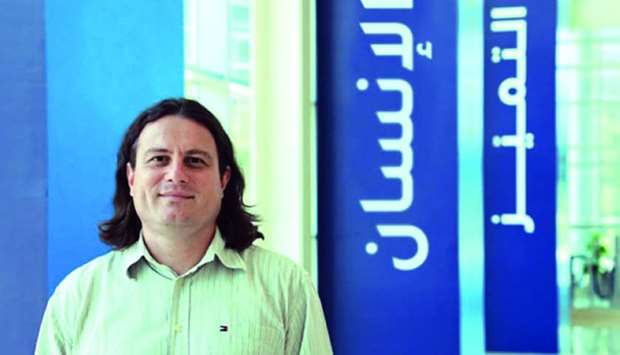Qatar Computing Research Institute ( QCRI), part of Hamad Bin Khalifa University, has developed a news aggregator platform, Tanbih, 'to uncover fake news at its very origin'.
“Tanbih, an Arabic term meaning ‘alert,’ is an intelligent platform to understand media biases," principal scientist Preslav Nakov told Gulf Times.
The platform, making use of Artificial Intelligence, understands whether it is emotional manipulation or appeal to authority.
"It can detect and understand the underlying reasons for the spread of fake news,” he said.
QCRI’s Arabic Language Technologies and Social Computing groups have been working with Massachusetts Institute of Technology (MIT) Computer Science and Artificial Intelligence Laboratory to develop Tanbih.
“The technology uses artificial neural-networks to represent text in a multi-dimensional space. Through a complex series of computations, it is able to identify disinformative content and pinpoint its bias.
"The platform is unique on several fronts: it puts technology in an actual product that users can easily operate, but it is also built to be region-specific, so it pays considerable attention to what is needed in this part of the world and it offers ways to address those needs,” explained Nakov.
The principal scientist said fake news makes people believe in wrong information very fast. “The spread of fake news has become the most sophisticated political weapon in the recent years. It all became so prominent in 2015-16, especially during the US elections. The rise of technology has made the spread of disinformation very fast and the implications can be dreadful and devastating. It could lead to several implications such as personalised attacks, mass mobilisations and grave health consequences among others,” he continued.
However, Nakov pointed out that the need of the hour is more media literacy and critical thinking. People have to be extra vigilant and analyse any news item from different angles to make sure that it is genuine or fake before it is shared.
“A recent report says that Finland is winning the war on fake news. They have invested in education against fake news and provided the right tools from primary schools to high schools and universities. They have also advertisement campaigns to provide media literacy and critical thinking. This is the right approach to fight fake news,” he pointed out.
Nakov said that the Tanbih is able to understand pre-identified and highly predictable propagandist techniques.
“As a news aggregator, Tanbih relies on a sophisticated series of data-run analytics to create media profiles. It attempts to uncover important information on media stance, centrality, hyper-partisanship, and inclinations when it comes to popular topics. One advantage of this technology is its capability to analyse Arabic media content,” maintained, Nakov.
The scientist pointed out that several organisations are at the forefront to fight fake news. Facebook and Twitter are waging a war against disinformation by removing fake accounts and other actions .
“Many social media platforms now integrate smart solutions that position fake news at the very bottom of the news feeds. They do not announce about these efforts in a big way as they are not the general regulatory bodies. However, these efforts will go a long way to fight disinformation,” he added.
The platform, making use of Artificial Intelligence, understands whether it is emotional manipulation or appeal to authority.
"It can detect and understand the underlying reasons for the spread of fake news,” he said.
QCRI’s Arabic Language Technologies and Social Computing groups have been working with Massachusetts Institute of Technology (MIT) Computer Science and Artificial Intelligence Laboratory to develop Tanbih.
“The technology uses artificial neural-networks to represent text in a multi-dimensional space. Through a complex series of computations, it is able to identify disinformative content and pinpoint its bias.
"The platform is unique on several fronts: it puts technology in an actual product that users can easily operate, but it is also built to be region-specific, so it pays considerable attention to what is needed in this part of the world and it offers ways to address those needs,” explained Nakov.
The principal scientist said fake news makes people believe in wrong information very fast. “The spread of fake news has become the most sophisticated political weapon in the recent years. It all became so prominent in 2015-16, especially during the US elections. The rise of technology has made the spread of disinformation very fast and the implications can be dreadful and devastating. It could lead to several implications such as personalised attacks, mass mobilisations and grave health consequences among others,” he continued.
However, Nakov pointed out that the need of the hour is more media literacy and critical thinking. People have to be extra vigilant and analyse any news item from different angles to make sure that it is genuine or fake before it is shared.
“A recent report says that Finland is winning the war on fake news. They have invested in education against fake news and provided the right tools from primary schools to high schools and universities. They have also advertisement campaigns to provide media literacy and critical thinking. This is the right approach to fight fake news,” he pointed out.
Nakov said that the Tanbih is able to understand pre-identified and highly predictable propagandist techniques.
“As a news aggregator, Tanbih relies on a sophisticated series of data-run analytics to create media profiles. It attempts to uncover important information on media stance, centrality, hyper-partisanship, and inclinations when it comes to popular topics. One advantage of this technology is its capability to analyse Arabic media content,” maintained, Nakov.
The scientist pointed out that several organisations are at the forefront to fight fake news. Facebook and Twitter are waging a war against disinformation by removing fake accounts and other actions .
“Many social media platforms now integrate smart solutions that position fake news at the very bottom of the news feeds. They do not announce about these efforts in a big way as they are not the general regulatory bodies. However, these efforts will go a long way to fight disinformation,” he added.


